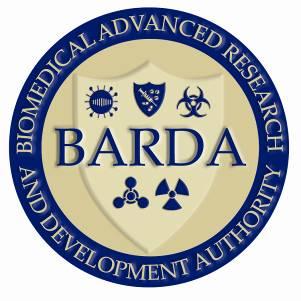There are no drugs licensed to treat any acute radiation damage to internal tissues. Sometimes, iodine tablets are taken with the intent of flooding the system with non-radioactive iodine so that the radioactive isotope iodine-131 will not be taken up by the thyroid and cause cancer.
“Acute radiation syndrome is caused by exposure to high doses of damaging (ionizing) radiation. ARS includes injuries to multiple organs, hemorrhaging, infection, and suppression of the immune system’s ability to fight organisms that cause infection.”
The U.S. Department of Health and Human Services has a division named Biomedical Advanced Research and Development Authority (BARDA) devoted to supporting. There are a number of drugs currently under development with support BARDA to either prevent radiation damage or to repair radiation damage to human tissues.
Neumedicines Inc has received 17 million dollars grant to evaluate the effectiveness and safety of a drug called HermaMax which is recombinant human interleukin-12 (fhuIL-12). Nuemedicine has already proved that HemaMax can mitigate radiation damage to bone marrow under a previous contract with BARDA. They are also working on manufacturing processes for HemaMax.
RxBio Inc is receiving 15 million to study the efficacy of its drug Rx100 for protection against radiation-induced gastrointestinal injury. Rx100 may protect or heal if administered within 72 hours of major radiation exposure. They are also working on development of manufacturing processes for the drug.
UAMS is receiving 4.5 million dollars to evaluate SOM230 and generate data so that Norartis which originally developed the drug for another purpose will be able to apply to the FDA for permission to use the drug to treat gastrointestinal radiation damage. The drug will reduce secretion of hormones by the pancreas which can aggravate intestinal inflammation accompanying radiation damage.
Araim Pharmaceuticals is receiving $3.1 million study ARA 290 to evaluate whether the drug improves survival when more than 24 hours after severe exposure to ionizing radiation. Test have indicated that the drug can be used in treating stroke, heart disease, and kidney failure through anti-inflammatory and tissue-protective action.
Cellerant Therapeutics is receiving an additional $16.7 million dollars to extend an ongoing contract. Cellerant is working on studies and manufacturing of CLT-008 as a treatment for neutropenia, a disease in which exposure to high levels of ionizing radiation causes a serious decrease in the number of white blood cells.
BARDA is also looking for candidates for additional grants to develop diagnostics and treatments for acute radiation exposure.
“BARDA, an agency within the Office of the Assistant Secretary for Preparedness and Response in the U.S. Department of Health and Human Services, provides a comprehensive integrated portfolio approach to the advanced research and development, innovation, acquisition, and manufacturing infrastructure for vaccines, drugs, therapeutics, diagnostic tools, and non-pharmaceutical products for public health emergency threats. These threats include chemical, biological, radiological, and nuclear threats, pandemic influenza, and emerging infectious diseases.”
In addition to the drug research being supported by BARDA a group of researchers at the Roswell Park Cancer Institute in Buffalo, New York are working on a drug called CBLB502. The drug was developed after it was discovered that bacteria flagellum which propel bacteria thru liquids has the ability to bind to receptors in human cells and confer protection against radiation. Tests on mice have shown that when the drug is injected into mice prior to radiation exposure, it helps cells resist the cellular suicide called apoptosis, protects the cells against free radicals which damage DNA and boosts their immune systems. No other drug in development is able to do all three of these things. Mice protected by this drug survived doses of radiation that killed unprotected mice.
